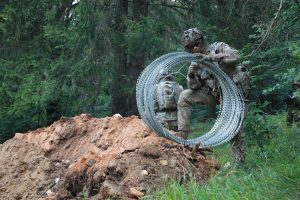Traits of Successful Leaders — Learning
“I have never met a man so ignorant that I couldn’t learn anything from him.”
– Galileo Galilei
The number of different scenarios or problems a leader could face are innumerable. This is one reason why successful leaders are constantly learning. While many leaders are forced into formalized learning programs, the best leaders find ways to develop themselves in addition to the institutional learning. Self-development/learning can come from many sources, including professional reading, case studies, testing out various styles of leadership, asking questions, and numerous others. Junior leaders or leaders newer to an organization will likely have a knowledge deficiency. This is to be expected. During one assignment in my career, many brand new officers worked for me a month at a time. I typically gave these officers some sort of task and enough guidance to get started. Watching how these new officers worked told me a lot about who they were. Some gave up because they didn’t understand some step of the task due to their inexperience. Others would ask questions or seek additional guidance from me. However, some of the best would seek out information on their own, ask for guidance as necessary, and find others who might know something about the topic. That ability to seek out and learn new information is crucial for leaders.
Learning through study and observation are two common methods. There is another method that can also be just as powerful: failure. Every leader who has been around for any length of time has either failed at something or is lying. Failure can be a powerful training tool, though unpleasant. One of my friends always says, “I’m grateful for the lesson, but very pained by the method of instruction.” Failing at a task is one thing but failing as a leader is entirely different. Doug Crandall in Leadership Lessons from West Point said, “Because leadership is about who we are, reckoning with leadership failures is extremely difficult. When we admit failure as a leader, we are looking in the mirror and admitting that we have violated the very essence of what we do, who we are, and who we want to be.”
Leadership failures, as Doug Crandall mentioned, can be difficult to process; yet they can be incredible sources of learning and growth. The most difficult situations can serve as a crucible moment for a leader, providing a transformative experience that shapes their world view. Some leaders may be debilitated by these experiences while others may use them as a spring broad for future success. Look at Steve Jobs. He was forced out of his own company, but eventually came back and turned it into one of the top companies in the World. Abe Lincoln also failed miserably multiple times as a leader and yet he is considered by some as one of our great presidents. Those experiences for both Jobs and Lincoln served as valuable lessons, from which they used to shape how they lead their company and the country. Which type of leader are you? Do you fit learning into your routine or do you wait for someone to tell you what to learn? Do you find ways to learn from difficulty or do you try to put the moment in your past?
———
In this series we will explore characteristics of successful leaders. Here is our list of traits so far:
Which characteristics do you think are the most important? Do you agree with our list so far? Comment below and tell us what we have right, what we have wrong, and what we should add.
———
Chad Plenge teaches leadership psychology at the United States Military Academy and develops high potential leaders with the US Army’s Center for Junior Officers. He holds a Master of Arts in Organizational Psychology from Columbia University, a Master of Business Administration, and a Bachelor of Science from the United States Military Academy. Chad is a certified Project Management Professional and an active duty officer in the US Army. In his free time, he serves as the President of the board of directors as well as an Assistant Director for a non-profit organization.
Related Posts

Going Off Script, But Staying on Track: A Career Guide for Junior Leaders
Intro I walked into LTC Tomi King’s office as a new 2LT in his formation. We discussed all the normal talking points in that initial counseling – family, where I …

Fighting as an Enabler Leader
(U.S. Army Photo by Cpl. Tomarius Roberts, courtesy of DVIDS)Enablers provide capabilities to commanders that they either do not have on their own or do not have in sufficient quantity …

Defeating the Drone – From JMRC’s “Skynet Platoon”
If you can be seen, you can be killed—and a $7 drone might be all it takes. JMRC’s Skynet Platoon discuss their TTPs to defeat the drone.
